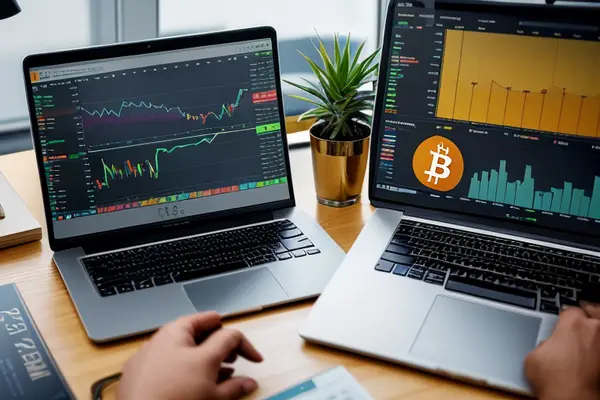Volatility
Volatility
What is Volatility?
When we talk about volatility in the context of option trading with cryptocurrencies, we are referring to the degree of variation of a cryptocurrency's price. In simpler terms, it's the measurement of price changes over a certain period, and these changes can be either up (increase in price), or down (decrease in price).
Understanding Volatility
For those who trade options with cryptocurrencies, understanding volatility is essential. Volatility is a key factor in determining the pricing of options. A cryptocurrency with high volatility is perceived to have potential for a larger price swing, which can command a higher price for its options. On the other hand, when a cryptocurrency is viewed as having low volatility, this signifies few expected price swings, and its options would thus be priced lower.
Volatility – an Important Element in Option Pricing
Besides the underlying asset's price and the time left until the expiration date, volatility is one of the crucial elements that affect the price of an option. Because it speaks directly to the risk involved in investing in a certain option. Higher volatility often indicates a greater risk, and therefore a greater potential reward.
How to Measure Volatility?
Volatility is typically measured in two ways: historical volatility and implied volatility. Historical volatility refers to the actual price changes of a cryptocurrency observed over a certain period in the past. In contrast, implied volatility is a number inferred from the current market prices of options, reflecting the market's expectation of future price changes.
Why is Volatility Important in Cryptocurrency Option Trading?
The importance of volatility lies in its role in determining the risk and potential reward in cryptocurrency option trading. High volatile cryptocurrencies might make large price movements in a short time, offering the potential for high profits, but also bearing the risk of substantial losses. Conversely, low volatile cryptocurrencies may promise smaller, but more consistent returns.
Using Volatility in Trading Strategy
Skilled traders use volatility as part of their trading strategy. They analyze the market's volatility, along with other major factors, to predict price directions and select the right options for trading. By understanding and utilizing volatility, traders can navigate the cryptocurrency market, managing risks and leveraging opportunities to their advantage.
Blog Posts with the term: Volatility

Crypto options trading allows speculation on future cryptocurrency prices without owning the asset, offering high returns with small investments but also significant risks. This guide covers essential concepts like call and put options, setting up a trading account, and basic...

The article discusses the concept of Crypto Options Expiry in cryptocurrency trading. It explains what it is, how it affects trading decisions and market volatility, and provides strategies for traders to maximize profits and manage risks. Understanding and effectively utilizing...

Crypto options contracts offer a new way for traders to hedge risk, diversify portfolios and speculate on price movements. These derivative trading instruments give the right but not obligation to buy or sell an underlying asset at a specific price...

This article simplifies the basics of crypto options trading, explaining key concepts like call and put options, strike prices, and expiration dates. It highlights the advantages such as leverage, risk management, flexibility, cost-effectiveness, and profitability in various market conditions while...

YouTube has become a key resource for learning option trading, offering channels that teach basics and advanced strategies to traders at all levels. Expert traders on YouTube also share tips on risk management, market research, and the importance of continuous...

A Bitcoin options trading strategy helps traders manage risk and capitalize on market movements by using contracts that offer the right, but not obligation, to buy or sell at a set price. Utilizing tools like strategy builders allows for precise...

The article provides a comprehensive beginner's guide to trading cryptocurrency options. It explains what crypto options are, how they work, and the different types of options available. The article also highlights the advantages and disadvantages of trading crypto options and...

This article explains the concept of the Bitcoin Adoption Curve, which represents the mainstream market penetration of Bitcoin. It discusses the different stages of adoption, the potential pros and cons, and factors that influence Bitcoin adoption. The article concludes by...

Option trading can enhance returns, but mastering entry and exit strategies is crucial for success. This article covers key indicators like moving averages, RSI, Bollinger Bands, MACD, and volume to help traders make informed decisions on when to enter or...

Robinhood's platform allows users to trade options without commission fees, offering a way to speculate on stock prices, hedge risks, or earn income. However, it involves higher risk than traditional trading and requires approval based on one’s experience and knowledge;...

The article introduces the mathematical equations essential for option trading, emphasizing their importance in determining option value and making informed decisions. It explains key terms and delves into the Black–Scholes model, a widely used formula for pricing European call and...

Understanding Bitcoin option skew is essential for traders as it reflects market sentiment and potential price movements, aiding in risk management and strategy optimization by analyzing implied volatility differences between calls and puts....

Bitcoin options trading provides a strategic approach to cryptocurrency investment, allowing traders the right to buy or sell Bitcoin at a predetermined price before expiration without owning the actual asset. Understanding calls and puts is crucial for navigating market volatility...

Crypto options trading, an innovative form of investment that allows traders to buy or sell a cryptocurrency at a specified price and date, is gaining popularity in the US. The Commodity Futures Trading Commission (CFTC) regulates this type of trading;...
